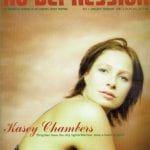Tom House – Welcome to the occupation
Music Row wasn’t about to cut any of House’s songs, and he worked in a bookstore, so the next step was natural: He founded his own literary journal, raw bone. “I got hooked up with this woman in Missouri who would print 150 of these things for $35,” he says. “So I could just about give the things away; if I sold 35 I’d made my money back. But it just got to be bigger and bigger, and her press broke down.”
raw bone emerged during one of America’s periodic poetry boomlets. “That went on for two or three years, and it just got to be too much,” House recalls. “It was astounding, the number of people who would send me poetry, not even having seen the magazine, having no idea at all the scatological shit that I was printing.”
Well, there’s obscenity and obscenity. Though contemporary art has made it increasingly difficult to shock an American audience, it’s not yet impossible. “Not if you do it well,” House says with an impish twinkle. “And I think I do it well. It’s a dying art,” he laughs, “cursing with style.” Mind you, his music isn’t unusually profane, just profoundly plain-spoken.
“I think a lot of people thought I was going to be like Bukowski,” he nods. “My poetry has a lot of obscenity in it, and it deals with drinking and the harder-edged stuff. But I never identified with Bukowski.”
raw bone couldn’t last, though House recently revived the name for a CD of poetry he sells at readings. “The last two or three [issues] I just published all my own stuff. I got tired of putting up with other people. And I was doing a lot of readings. Nashville had a really good reading series down at Windows On The Cumberland [a small downtown club not far from the Wildhorse Saloon], for about seven years, the first Thursday of every month. All kinds of poets — street poets, academic, everybody got their little slot, very homogeneous, until the slams started coming in.”
And so that scene broke apart, as well.
Didn’t matter, House was busy writing…something, fireflies of ideas filling tapes and journals, spilling out onstage. “I remember one night I played down at Windows On The Cumberland, I taped the show and I did like 62 songs. Two-minute-long songs. I’d finish one up, say thank you, do the next one. Strum a chord, start a song.
“I’ve always done the music, I just never did anything with it, except play in bars,” he continues. “Well, I wasn’t really aware of the independent thing, that there was any outlet for it, until I met Eric at Bloodshot. Anybody that I had ever had to deal with in the industry here was just so totally unimpressed that…
“I really didn’t care. I just did that because that’s what my friends did, and that’s what my dad used to do: He got drunk and played music.”
About the time House began releasing records, his second marriage wore out, and he began changing department store lightbulbs for a living. Altogether, so far as can be told, it was the best of times. (He’s even still friends with that ex-wife.) “Gol, that was great,” he laughs. “I spent almost a year in Florida, in different cities, and almost a year in Texas.
“It was all coordinated through Manpower. I’d get a crew to change all the lightbulbs up in the ceiling and wipe down the dust bunnies. All the perimeter bulbs, up under the dresses and the men’s suits; it’s nuts how many lightbulbs there are.
“So they’d just do that on a five-year schedule, because fluorescent lights don’t blow out like incandescent bulbs do. The gas gets more sluggish and they get less and less bright. It would take about three weeks…no matter how bad the town was, you can stand anywhere for three weeks. Even Odessa I could stand for three weeks.”
The literary community took note of House’s budding musical career along the way. He collaborated on a commission to create a musical presentation of Faulkner’s As I Lay Dying, first offered on a dry Sunday afternoon in Oxford, Mississippi. That same team co-wrote a musical version of Lee Smith’s epistolary novel Fair And Tender Ladies, and recently finished a similar treatment of Florida writer Connie May Fowler. It has almost been enough.
“I haven’t had that job for about a year or two,” he says. “I’ve just been playing music, that’s it. I’ve basically been living off the money I made while I was changing lightbulbs. I just amassed a fortune doing that, because they paid out the wazoos and I had no expenses at all.
“I own my car, and they paid for the motel, and for the gas, I’m making twelve and a half dollars an hour, and $28 a day per diem. When they terminated the program, I had $30,000 in the bank. So I’ve been living on that, and then these literary things I do, that’s where I make the bulk of my money. See, that Fair And Tender Ladies play was put on this past year in Virginia, and there are two productions of it slated for next year, and Alabama Shakespeare Festival took it on the road last fall. So every time that runs I get a royalty check, that’s really good money.”




